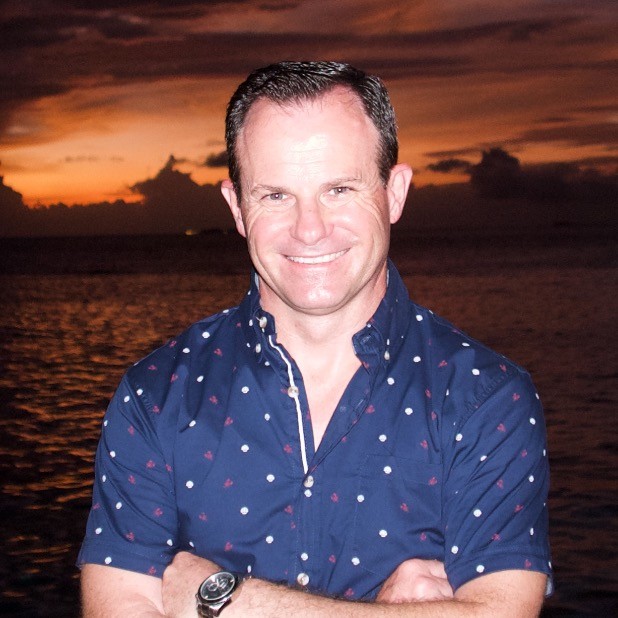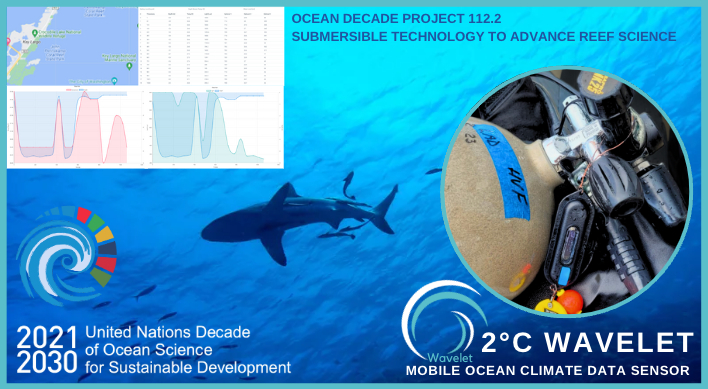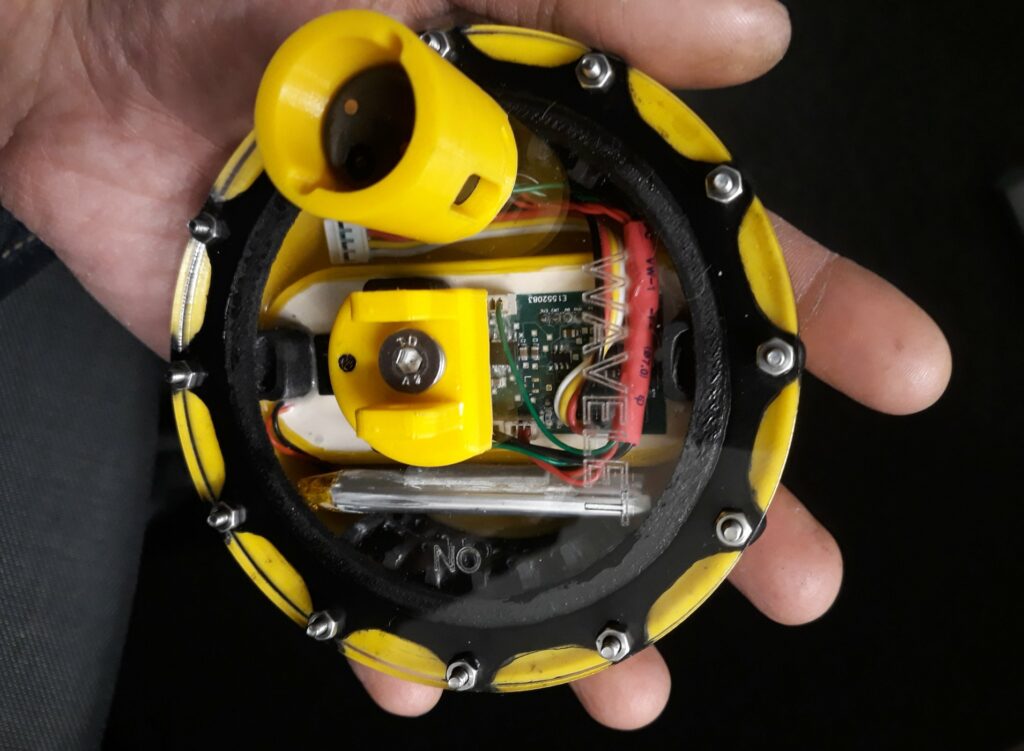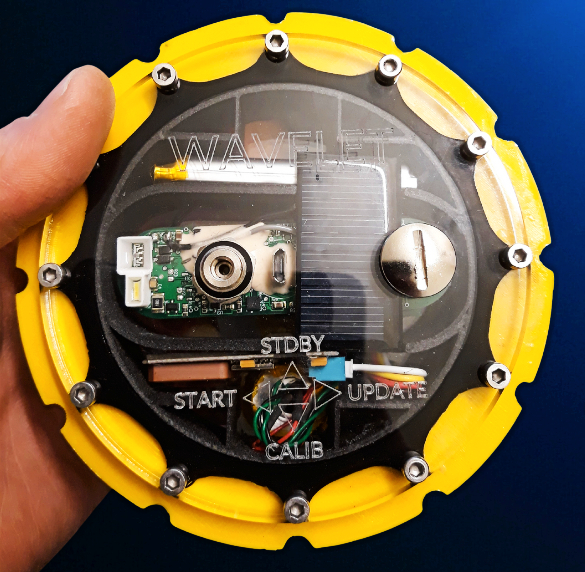Scuba divers are the people best-placed to monitor exactly how climate change is affecting the world’s oceans, says experienced diver Neil van Niekerk, who dreams of equipping us all with a wearable sensor that will automatically report on the water conditions wherever we choose to dive.
In the coming years he wants as many as possible of the world’s estimated six million active scuba divers to be carrying his Wavelet device. He envisions a global community of citizen-scientists, gathering and sharing accurate climate data to fill what he sees as critical gaps in our knowledge, and enabling scientists to devise appropriate solutions.
van Niekerk, a PADI Master Scuba Diver Trainer and SSI Platinum Pro 5000 Diver, formed the non-profit body 2°C in St Petersburg, Florida in 2019.

As its executive director, he went on to devise the Wavelet, which measures water temperatures, salinity, light levels, conductivity, pressure and other data, using built-in GPS to pinpoint and record where its observations are made.
The Wavelet’s sensors are attached to the regulator first stage, making the underwater data-gathering process entirely passive and non-distracting for the diver. Collected data is uploaded automatically to cloud-based servers for sharing with the scientific community.
Fewer than 100 of the world’s coral reefs currently enjoy sustained and openly accessible in situ oceanographic monitoring, according to 2°C – it’s expensive, while equipment maintenance and vandalism present considerable challenges.
And while we might expect satellite remote sensors to be the ideal way of monitoring nearshore oceanographic conditions, in practice shallow and clear water, sandy seabeds and “land adjacency effects” are said to present a whole range of problems for “eyes in the sky”.
Wavelets on test
The Wavelet technology is currently being tested by 20 US scuba divers, but van Niekerk is hoping that the concept will scale quickly. “We are currently in development of the third-generation Wavelet with our tech partner in Sweden,” he told Divernet.
“Our hope is to have a few of these completed for another round of Alpha testing shortly and, if that works as hoped, then we will use this design to advance to Beta-testing with partners.”
“Divers in the UK would certainly be welcome to participate – however, to manage expectations, it may still be some time before we are ready to initiate this.”

The original prototype collected only light and temperature data but has since been totally re-engineered, says van Niekerk. “Our initial work was to build the end-to-end data flow so, as the diver surfaces, the Wavelet would be able to pass on the observations without the opportunity for bias interference.
“Although successful overall, there were teething problems that we have largely overcome with the redesign. The latest prototype version also includes solar charging, thus largely eliminating the need to ever open the sensor, and helping to prevent water intrusion.”
Components and sensors have been placed by hand on the prototypes, rendering the unit larger than necessary. “This can be streamlined and downscaled through manufacturing processes.”
At present, costs also remain a challenge. “As we are a small non-profit that is not funded, progress has been limited to partnerships, which has slowed the process down significantly,” admitted van Niekerk, adding that 2°C was seeking corporate sponsorships and would welcome any suggestions for accelerating the process.
“With very low volume and high work-time to complete, the costs are very high,” he says. “However, our mission since 2016 has been to see an end-user price of $199 [£157] realised.” The prototypes currently cost more than $400 to build by hand, but “in time and with partnerships and supply-chain contracts in place, we believe it is still achievable”.
Getting Wavelets out there
“The public is increasingly overwhelmed at the magnitude of climate change and detached from the science that could support solutions,” says van Niekerk.
“Long-time scuba divers lament the deterioration of once-pristine reefs, and local economies that depend on dive-tourism are negatively impacted. This presents an important opportunity to engage recreational scuba divers as citizen-scientists.”
So how would divers be equipped with Wavelets? Through subsidised dive-centres initially, says van Niekerk, who says that independent divers still base their travel decisions on bucket-lists, “and the health of the reef makes a compelling motivator for many, as it determines local species availability and, after all, that’s why many of us dive!”
For this reason he believes that tourism authorities will support the deployment of Wavelets “both in stakeholder negotiation and financial support, in order to protect the tourism product”.

He envisages working with these “stakeholders” – dive operators around the world – to build and sustain the citizen-science model of guests with “accurate, low-cost automated sensor technology” attached to their dive-gear.
The data-collection might be passive, but divers would be “engaged throughout the process via scientific research project opportunities, data challenges, social-media networking and, when the data they collected are used, citations/acknowledgements. Dive-industry partners might also choose to reward voluntary participation.“
Only after engaging the dive operators would 2°C look at equipping individuals. “This is strategic, as dive operators have equipment in the same general locations daily, which is very important from a statistical average standpoint when looking at the data.
“As we work out the kinks in the end-to-end platform, individual divers will be able to play a more significant role, especially in remote locations that are less frequently visited.”
To encourage sales of Wavelets to divers, could they offer a secondary purpose that directly benefits the owner? van Niekerk thinks they could. “Each Wavelet has built-in GPS. Although it is not intended as a personal location device, it is perceivable that this be a point of discussion in the future,” he says.
And as diver-to-diver gifts? “Yes, that would be a huge win for everyone!” Find out more about Wavelets on the 2°C site.
Also on Divernet: How climate-change affects UK seas, Northern Red Sea has ‘climate-change insurance’, UK corals will be climate-change ‘winners’, Remote Pacific coral reef shows some ability to cope with ocean warming


I don’t dive the oceans. I only dive in fresh water lakes.
I think this is an excellent idea and would definitely assist. Climate change is real. There is definitely change out there whether climate related or cruise ship related. Either way, divers helping to monitor this change is a way to help understand the problem.
First off, I think monitoring the oceans is a great idea. But let’s not put the blame on climate change because for anyone who has done its research knows its a scam.
Cruise ships are a great concern for the coral reefs and are doing major damage.
The solution from plastic is also killing our oceans. None of these will ever stop due to cost and the money cruise ships bring to small countries.